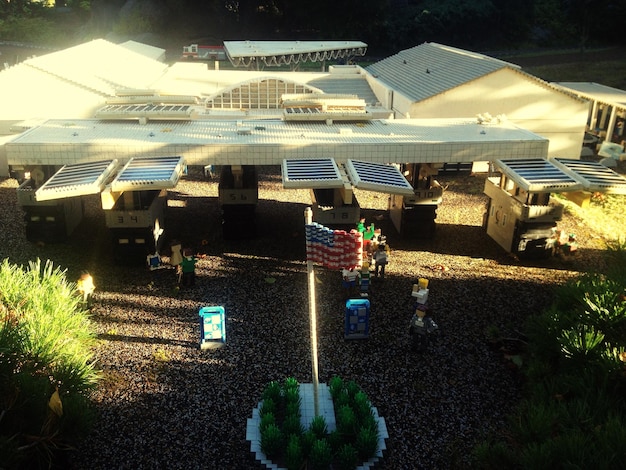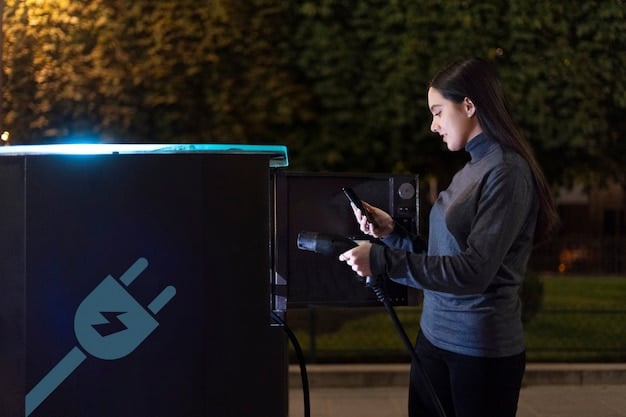Green Tech US Startups: Leading Sustainable Innovation & Cutting Carbon

Green tech startups in the US are spearheading sustainable solutions, significantly reducing carbon footprints by leveraging innovative technologies and strategies.
The United States is witnessing a surge in green technology innovation, with numerous startups dedicated to creating sustainable solutions. These companies are not only developing groundbreaking technologies but are also actively working towards reducing carbon footprints across various industries. This article shines a Startup Spotlight: Green Tech Innovators: US Startups Leading the Charge in Sustainable Solutions and Reducing Carbon Footprint by 25%.
The Rise of Green Tech Startups in the US
The green tech sector is experiencing unprecedented growth, fueled by increasing environmental awareness and supportive government policies. Startups are at the forefront of this revolution, bringing fresh ideas and agile approaches to tackle climate change.
These innovative companies are developing solutions ranging from renewable energy and energy efficiency to sustainable agriculture and waste management. Let’s delve deeper into the key factors driving this growth and the challenges these startups face.
Investment in Green Technology
Venture capital firms and angel investors are increasingly recognizing the potential of green tech startups. Billions of dollars are being poured into companies developing sustainable solutions.
Government Support and Incentives
The US government has implemented various policies and incentives to encourage the growth of green tech, including tax credits, grants, and research funding.
- Tax incentives for renewable energy projects.
- Grants for research and development of clean technologies.
- Regulations promoting energy efficiency and emissions reduction.
The rise of green tech startups in the US is a testament to the growing recognition of the urgent need for sustainable solutions. With increasing investment, supportive policies, and a wave of innovative ideas, these startups are poised to make a significant impact on reducing carbon footprints and building a more sustainable future.

Innovative Green Tech Solutions
US green tech startups are pioneering a wide range of innovative solutions aimed at reducing carbon footprints and promoting sustainability. These solutions span various sectors, including energy, transportation, agriculture, and waste management.
From advanced battery technologies to sustainable farming practices, these startups are pushing the boundaries of what’s possible. Let’s explore some of the groundbreaking technologies being developed.
Renewable Energy Technologies
Startups are developing advanced renewable energy technologies, such as next-generation solar panels, wind turbines, and energy storage systems. These technologies are more efficient, cost-effective, and reliable than ever before.
Sustainable Agriculture Practices
Agtech startups are revolutionizing agriculture with sustainable practices, such as vertical farming, precision irrigation, and bio-based fertilizers.
- Vertical farming: Growing crops in vertically stacked layers indoors, reducing land use and water consumption.
- Precision irrigation: Using sensors and data analytics to optimize water usage in agriculture.
- Bio-based fertilizers: Developing fertilizers from renewable resources, reducing reliance on synthetic chemicals.
The innovative green tech solutions being developed by US startups are paving the way for a more sustainable and resilient future. By harnessing the power of technology, these companies are addressing some of the most pressing environmental challenges facing the world today.
Startup Spotlight: Prominent Green Tech Innovators
Several US-based green tech startups are making significant strides with their innovative solutions. These companies are not only developing cutting-edge technologies but are also demonstrating a commitment to sustainability and environmental stewardship.
Let’s take a closer look at some of these prominent innovators and their groundbreaking contributions to the green tech sector.
Company A: Solar Panel Innovators
Company A is developing next-generation solar panels with increased efficiency and reduced manufacturing costs. Their innovative designs are making solar energy more accessible and affordable for homes and businesses.
Company B: Sustainable Agriculture Solutions
Company B is revolutionizing agriculture with sustainable farming practices and innovative technologies. Their solutions are helping farmers reduce water consumption, minimize chemical inputs, and improve crop yields.

Here are some key highlights of Company B’s approach:
- Precision irrigation systems.
- Bio-based fertilizers.
- Data-driven crop management.
These startups exemplify the innovative spirit and commitment to sustainability that is driving the green tech revolution in the US. Their groundbreaking technologies and practices are not only transforming their respective industries but are also contributing to a more sustainable and resilient future for the planet.
Challenges Faced by Green Tech Startups
While the green tech sector is experiencing rapid growth, startups in this space face numerous challenges. These challenges range from securing funding and navigating regulatory hurdles to competing with established players in the market.
Overcoming these challenges requires resilience, strategic planning, and a strong commitment to innovation. Let’s explore some of the key hurdles these startups encounter.
Access to Funding and Investment
Securing funding is a major challenge for green tech startups, particularly in the early stages of development. Investors may be hesitant to invest in unproven technologies or markets.
Regulatory and Policy Hurdles
Navigating the complex landscape of environmental regulations and policies can be a significant challenge for green tech startups. Compliance with these regulations can be costly and time-consuming.
Overcoming these challenges requires a multifaceted approach:
- Building strong relationships with investors and venture capital firms.
- Advocating for supportive policies and regulations.
- Demonstrating the value proposition of green tech solutions.
Despite these challenges, green tech startups are demonstrating remarkable resilience and determination. By overcoming these hurdles, they are paving the way for a more sustainable and prosperous future.
Policy and Regulatory Landscape for Green Tech in the US
The policy and regulatory landscape plays a crucial role in shaping the growth and development of the green tech sector in the US. Supportive policies and regulations can incentivize innovation, attract investment, and accelerate the adoption of sustainable solutions.
However, complex and inconsistent policies can also create barriers to entry and hinder the growth of green tech startups. Let’s examine some of the key policy and regulatory considerations.
Federal Policies and Regulations
The US federal government has implemented various policies and regulations to promote green tech, including tax credits for renewable energy, grants for research and development, and emissions standards for vehicles and industries.
State and Local Policies
In addition to federal policies, many state and local governments have implemented their own initiatives to support green tech. These initiatives include renewable portfolio standards, energy efficiency mandates, and green building codes.
Here are some examples of state-level policies:
- Renewable portfolio standards: Requiring utilities to generate a certain percentage of their electricity from renewable sources.
- Energy efficiency mandates: Setting minimum efficiency standards for appliances and buildings.
- Green building codes: Promoting the construction of energy-efficient and environmentally friendly buildings.
The policy and regulatory landscape is constantly evolving, and green tech startups must stay informed about the latest developments to navigate this complex environment effectively. By engaging with policymakers and advocating for supportive policies, these startups can help create a more favorable environment for innovation and sustainability.
Future Trends in Green Technology
The green tech sector is poised for continued growth and innovation in the years to come. Several key trends are expected to shape the future of green technology, including advancements in renewable energy, sustainable transportation, and circular economy solutions.
These trends will not only transform various industries but will also create new opportunities for green tech startups to innovate and scale their solutions. Let’s explore some of the most promising future trends.
Advancements in Renewable Energy Storage
Energy storage technologies, such as batteries and pumped hydro storage, are becoming increasingly important for integrating renewable energy into the grid.
Sustainable Transportation Solutions
The transition to electric vehicles (EVs) and other sustainable transportation solutions is accelerating, driven by advancements in battery technology, charging infrastructure, and policy support.
Here’s a breakdown of key trends in sustainable transportation:
- Electric vehicles (EVs).
- Hybrid electric vehicles (HEVs).
- Alternative fuels.
These future trends in green technology hold immense promise for addressing climate change and building a more sustainable future. By embracing innovation, collaborating with stakeholders, and advocating for supportive policies, green tech startups can play a crucial role in shaping this future and driving the transition to a low-carbon economy.
| Key Point | Brief Description |
|---|---|
| 🌱 Green Tech Rise | US startups are driving sustainable solutions and reducing carbon footprints. |
| 💡 Innovative Solutions | Startups are pioneering renewable energy, sustainable agriculture, and waste management. |
| 💰 Funding Challenges | Securing investment remains a significant hurdle for green tech startups. |
| ⚖️ Policy Impact | Government policies and regulations shape the growth and development of green tech. |
Frequently Asked Questions
▼
Green tech startups are companies that develop and commercialize technologies aimed at reducing environmental impact and promoting sustainability across various sectors.
▼
These startups employ various strategies, including developing renewable energy solutions, promoting energy efficiency, and implementing sustainable agriculture practices to lower carbon emissions.
▼
Government policies, such as tax incentives and grants, play a crucial role in incentivizing innovation and investment in green technologies, fostering a supportive environment for startups.
▼
Challenges include securing funding, navigating complex regulations, and competing with established players. Overcoming these requires resilience and strategic planning.
▼
Future trends include advancements in renewable energy storage, sustainable transportation solutions such as EVs, and broader adoption of circular economy practices.
Conclusion
Green tech startups in the US are at the forefront of driving sustainable innovation and reducing carbon footprints. Their groundbreaking technologies and commitment to environmental stewardship are paving the way for a more sustainable and resilient future. By overcoming challenges, leveraging supportive policies, and embracing future trends, these startups are poised to make a significant impact on the world.
![Exploring Innovative Solutions with [Startup Name] Exploring Innovative Solutions with [Startup Name] - Cover Image](https://oneteknology.com/wp-content/uploads/2025/06/oneteknology.com_14_1750956884_ce64b9eb_cover-360x180.jpg)
![[Startup Spotlights: Unveiling Innovations and Disruptive Companies] [Startup Spotlights: Unveiling Innovations and Disruptive Companies] - Cover Image](https://oneteknology.com/wp-content/uploads/2025/06/oneteknology.com_14_1750957077_127d072e_cover-360x180.jpg)

![How [Startup Name] is Disrupting the [Industry] Market How [Startup Name] is Disrupting the [Industry] Market - Cover Image](https://oneteknology.com/wp-content/uploads/2025/06/oneteknology.com_14_1750956866_6859b264_cover-360x180.jpg)

